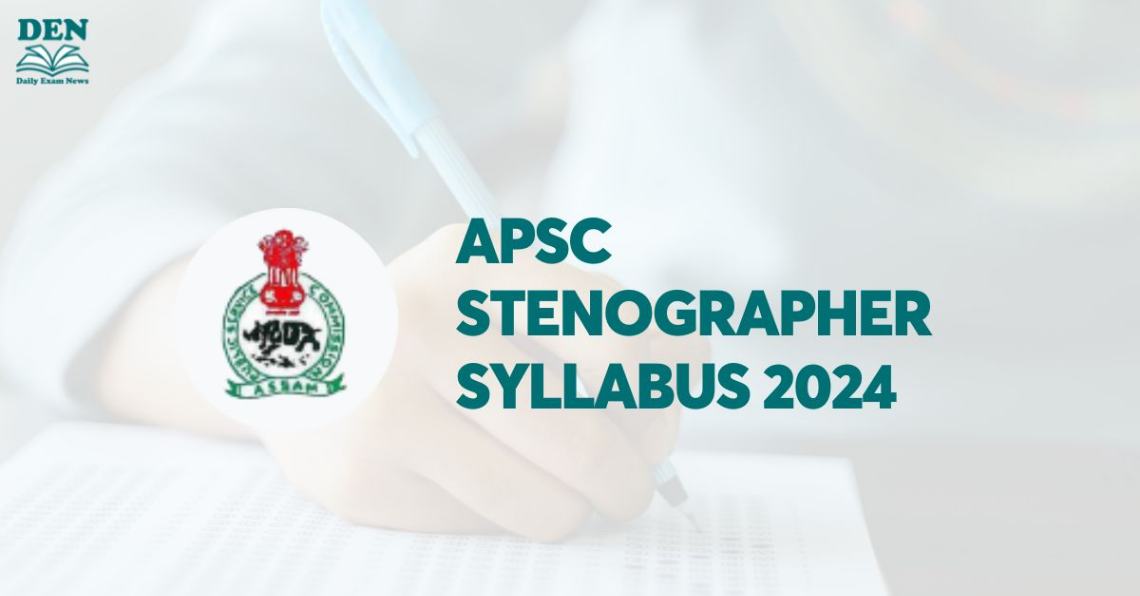The APSC Stenographer Syllabus 2024 has been declared through an official notification on the website of Assam Public Service Commission. The APSC Stenographer syllabus and exam pattern are available for download in PDF format on the commission’s official website for all the qualified and interested applicants. Apart from this, the candidates should be aware of the exam dates as well as the syllabus and exam pattern for the APSC Stenographer position. There will be a written examination with objective type of questions and a maximum of 100 marks will be there for the written exam. The candidates will get a total of 2 hours to complete the written exam.
The Stenography Proficiency Test and the Written Test are the two phases of the selection process. Candidates must make it through both the selection rounds in order to be considered for the APSC Stenographer Job Profile. The candidates can download and follow the APSC Stenographer Syllabus to make sure they only study the courses that are essential for the exam.
APSC Stenographer Syllabus 2024
The APSC Stenographer Syllabus 2024 is available now which will include subjects such as General Knowledge, English, Computer Knowledge etc. The topics to cover includes Economic Planning, Public Finance, Current Affairs, Concepts of programming languages, English language, networking, roles of bank, money market, computing concepts, framework of web applications etc.
General Knowledge Syllabus
| Topic | Description |
| Current National and International Events | Major events happening globally and nationally |
| Economic Planning | Strategies and goals of economic development |
| Public Finance | Revenue, expenditure, and public sector economics |
| National Income | Measurement and calculation of national income |
| Bills | Types and procedures of different bills in parliament |
| Taxes on Income and Expenditure | Overview of taxation systems in India |
| Concepts of Budget | Structure and types of budgets |
| Finance Commissions | Role and functions of the Finance Commission of India |
| Revenue of Central Government | Major sources of revenue for the government |
| Science and Technology | Innovations, research, and technology developments |
| Financial and Railway Budget | Analysis of financial and railway budgets |
| Money Market in India | Structure and functioning of the money market |
| Schemes and Policies by Government | Recent government schemes and their impact |
| Types of Banks | Different categories of banks and their functions |
| Capital Market in India | Overview of the stock market and securities |
| Role of Banking | Role of banks in the economy |
| RBI and its Monetary Policy | Monetary policy and role of RBI |
| Books and Authors | Popular books and their authors |
English Syllabus
| Topic | Description |
| Grammar | Basic rules of grammar |
| Comprehension | Understanding passages and answering questions |
| Articles | Use of definite and indefinite articles |
| Verb | Forms and functions of verbs |
| Error Correction | Identifying and correcting grammatical errors |
| Idioms & Phrases | Commonly used idioms and their meanings |
| Subject-Verb Agreement | Ensuring subject and verb consistency |
| Fill in the blanks | Completing sentences with appropriate words |
| Adverb | Types and uses of adverbs |
| Preposition | Rules for preposition usage |
| Unseen Passages | Reading comprehension with unseen texts |
| Sentence Rearrangements | Rearranging jumbled sentences into meaningful sentences |
| Tenses | Usage of different tenses |
| Vocabulary | Knowledge of words and their meanings |
| One word substitution | Using one word in place of a phrase |
| Synonyms & Antonyms | Words with similar or opposite meanings |
| Correct the sentence | Fixing grammatically incorrect sentences |
Computer Knowledge Syllabus
| Topic | Description |
| Knowledge of C++ | Concepts of C++ programming |
| Operating Systems-DOS | Basics of DOS operating system |
| PH | Concepts of programming languages |
| MS SQL Server | Database management with SQL Server |
| ASP.NET | Framework for web applications |
| ADO.NET | Data access technology in .NET |
| Java & Javascript | Programming languages and their applications |
| Firewall & antivirus | Security tools and their functionality |
| UML | Unified Modeling Language for software design |
| Object-Oriented designing | Concepts of object-oriented programming |
| Javascript | Scripting language for web development |
| Networking with LAN/WAN | Basics of networking (LAN/WAN) |
| Window OS Client & server | Operating systems for clients and servers |
| Novel | Concepts of innovative technologies |
| Window Services | Windows services and their functions |
| Web Services | Web-based services and applications |
| Grid Computing | Distributed computing concepts |
| Oracle PL SQL Architecture | Database architecture using Oracle PL SQL |
| Embedded System | Real-time operating systems and embedded devices |
| Image Processing | Techniques in digital image processing |
| OS | Overview of operating systems |
APSC Stenographer Exam Pattern 2024
Applicants who want a close-up view of the selection process should adhere to the APSC Stenographer Exam Pattern. The final merit list selection process will be mostly based on the combined scores of the candidates in the written exam and stenography competence test. The following describes the specific exam format for each of the selection procedures:
Stage I: Stenography Proficiency Test
In the Stenography Proficiency Test, 40 marks is the minimum qualifying score. The applications who will get approval will be getting an invitation to take the stenography proficiency test. The test will be held at 150 wpm in English and 120 wpm in Assamese, Bengali, and Hindi:
| Post | Stenography Speed | Time for dictation of trial passage | Time for dictation of the test passage | Time for revision of test passage by candidate | Time for Transcription |
| Stenographer-Grade I (English) | 150 WPM | 2 min | 3 min | 10 min | 45 min |
| Stenographer Grade-I (Language) | 120 WPM | 2 min | 3 min | 10 min | 60 min |
Stage II: Written Test
A shortlist of qualifying candidates will take the written exam. These candidates passed the stenography proficiency test. The written exam will be of an objective style, with a total of 100 marks distributed among the following subjects:
| Subject | Marks | Duration |
| English | 50 | 2 Hours |
| Knowledge and ability to operate Computer | 20 | |
| General Knowledge | 30 | |
| Total | 100 | 2 Hours |
Check here for more information-
Hopefully, this information was useful for all the aspiring candidates preparing for the government exams. Check DailyExamNews to stay informed about the latest recruitments, tests, vacancies, and developments regarding government exams.

